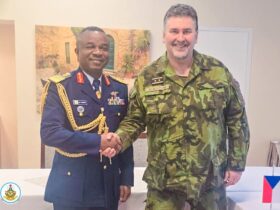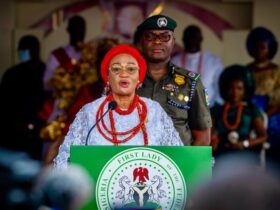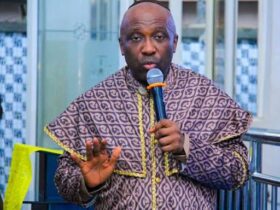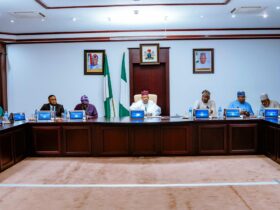By Ngozi Nwachukwu ,
- A Media Practitioner & Alternative Energy Solution Expert
Nigeria, as a developing economy, no doubt, has a myriad of multi-faceted challenges.
These challenges, include cultural, social, economic, political, scientific, technological and developmental, amongst others.
However, recent experiences and impressions, over the decades, have shown that at the root of all these myriads of problems, is the fundamental subject of stable, reliable and sustainable provision of nationwide electrical energy to empower the rural dwellers and down-trodden.
Essentially, Nigeria’s current energy challenges, can be said to be a strong determinant to the functionality of all facets of development administration.
Almost all establishment circles of government, the organized private sector and significant other clusters of human settlements, are equally affected by the social problem of energy-cost and energy-solutions.
This much was brought to the front burner, a few weeks ago, in Nigeria’s Federal Capital Territory, Abuja, during the official state visit of the President of the World Bank, Mr. Ajay Banga.
The World Bank President, apparently, being familiar with the nature and profile of most developing economies, of which Nigeria, is part, was quick to zero-in on the concept alternative, clean and renewable energy solutions, as the panacea to growing social problem of national grid-power outages, experienced in Nigeria.
The World Bank President, apparently being familiar with the nature of most developing economies, of which Nigeria, is part, was quick to zero-in on the concept of alternative, clean and renewable energy solutions, as the panacea to growing social problem of national grid-power outages, experienced in Nigeria.
For instance, it was a very disturbing development to learn that in the year 2020 alone, the World Bank, in its social survey, projected that the financial cost of power -outages in Nigeria, stood at about a whopping $28 Billion, which approximately, accounts for about 2% of the nation’s Gross Domestic Product.
This is when viewed against the backdrop that Nigeria, as the leading economy in Africa, is said to have an installed power capacity of more than 13, 000 megawatts, with a daily average of about 3,000 and 4,000 megawatts , dispatched to highly financially over-stretched consumers, whose economic conditions of existence, may have been affected by the petroleum products subsidy removal, to a poor transmission and distribution network.
However, the good news is that the World Bank President, in his maiden visit to Petti Community of Kwali Area Council of the Federal Capital Territory, Abuja, gave very encouraging assurances that were matched with action. He renewed the already fragile hopes about better days ahead in Nigeria’s troubled electricity sector.
Key representatives from Nigeria’s Rural Electrification Agency (REA), Nigeria Electrification Project [NEP] the World Bank, Federal Ministries of Finance & Power, respectively, were on hand to witness and validate the World Bank President’s site inspection assessment tour.
This is even as the outing provided insights into the transformative power of renewable energy in off-grid communities, in Nigeria as the World Bank President, affirmed.
The visit, showcased an exemplary collaboration between local and international bodies towards, combating climate change and uplifting local communities, from rural poverty and ensuring that citizens in metropolitan areas, do not suffer urban misery.
This intervention not only serves as a testament to the potential of renewable energy but also redefines how rural areas can achieve electrification targets and assuage their basic-needs and felt-needs.
By way of a tie-back to history, it is true to state that, ‘’the growing level of national grid power -generation deficit, is what promoted the Federal Government of Nigeria to establish the Rural Electrification Agency {REA}, with the Nigeria Electrification Project {NEP}, respectively, providing mini-grid solutions as alternative solar-enabled energy systems, across underserved and unserved local communities in Nigeria, with NEP at the heart of this laudable initiative.
The Managing Director of the Rural Electrification Agency, (REA) Engr Ahmad Salihijo Ahmad, using the instance of the visit, elaborated on the project’s objective, which extends beyond simply providing electricity, when he said, “We ensure interconnectivity with the grid when it arrives. Today’s visit showcases our commitment not to leave anyone in the rural communities behind.
We have recorded some tangible impacts like powering boreholes, shops, and homes in the Petti community “.
Engr. Ahmad Salihijo Ahmad, shared details about the agency’s broader scope and interventionist mechanisms, this way, “Beyond the NEP, our projects, often piloted through government funding, focus on crucial areas of human services such as health, agriculture, and education. We also have the Rural Electrification Fund which collaborates with state governments and the private sector, respectively.”
The identification of these communities, as explained by the MD, stems from geospatial data and partnerships with local and state governments. This ensures that even the most remote areas, which aren’t economically viable for grid extension, benefit from renewable energy solutions.
Commenting on the trending nationwide alternative energy policy option to the official removal of petroleum products subsidy, which has now known as the Presidential CNG Initiative, [PCNGI], otherwise known as the Compressed Natural Gas (CNG) , Engr. Ahmad Salihijo Ahmad, underscored its alignment with REA’s goals. “In places like Petti, we offer a sustainable alternative to small generators that rely on petrol, reducing costs and environmental impact,” he noted.
Engr Ahmad Salihijo Ahmad, emphasized that the contributions of the REA-NEP, in addressing the solar-powered energy alternative to World Bank enabled mass electrification projects, is instructive and very unique that even the World Bank, had given high commendations to it, scoring the REA-NEP high in terms of quality job delivery, accountability, transparency and honesty in project execution.
He explains the special approach this way, “” So, essentially, we move around, you know through the plan that we have drawn, through the rural electrification scheme, even as we continue to identify these communities across the country and we ensure that once a community is a certain distance away from the grid and owing to the fact that grid extension is not usually economical, we apply some of these technologies to ensure that we bring power to them””.
The REA MD, believes that renewable energy will bring lasting solutions to the climate conditions in Nigeria. He gave an insight into how this projection, would be feasible.
“” I know that our role as the Rural Electrification Agency (REA), under the Federal Ministry of Power , demands that we are designed to serve areas that are entirely off-grid. So the site inspection assessment visit of the World Bank President today, in Petti community, of Kwali Area Council of the FCT, Abuja, is a demonstration of one of those areas. But what we ensure that we do is that during the design of these projects, we ensure that once the grid comes, there is the technology for the impact we are bringing to a community like Petti. “” You have been able to see that we are powering a productive use , we are powering a bore-hole , we are powering a shop right behind us in this village””. The rural dwellers in this community have been able to benefit from the projects””. The whole idea is that while we continue to improve on the grid – space, we use this sort of intervention to ensure that we have not left anybody in the communities, behind””.
The Head of Project Management Unit (HPMU) at the Nigeria Electrification Project (NEP), Mr. Abba Aliyu,, like any other alternative energy expert in Nigeria, summarizes his views about Nigeria’s energy sector challenges this way.
“” The power sector in Nigeria, has indeed faced a lot of challenges over the years, specifically, in the area of inadequate power supply infrastructure, financial situation of the electricity market, capability and capacity of the distribution companies to continue make investments as well as collect payments for electricity supplied to the last man””.
Abba Aliyu, is of the opinion that the challenges, currently facing the Nigerian electricity sector, are surmountable and can be addressed through proactive and well- thought policy design and policy implementation.
“” Renewable energy, in my own opinion, offers a promising avenue towards addressing these challenges as well as providing lasting solutions therein.”.
According to Abba Aliyu, renewable energy, is sustainable, based on the following reasons : {1 } Renewable energy, provides a diversification of energy successes, given that one of the key advantages of renewable energy, is its ability to diversify the energy mix. { 2 }When you consider Nigeria as a whole, the citizens, currently rely heavily on fossil fuel, as about 70% of our generation capacity, is through fossil fuel “”.
He revealed that the alternative reliance on renewable energy, provides Nigeria, with additional avenue to generate electricity, without necessarily, relying on fossil fuel..
Solar-powered alternative energy sources, in addition to wind, biomass and hydro, are resources that Nigeria, has in great abundance, across the six geopolitical zones.
Solar radiation, in the words of Abba Aliyu, is very high in Nigeria, especially in the far northern geo-political zones, while in the middle -belt region and other parts of the country, there opportunities and potentials, for small, medium and large hydro electricity systems.
The President of the World Bank, lent credence to the views of the Head of Project Management Unit of the Nigeria Electrification Project, { NEP}, when he emphasized on the larger picture about renewable energy as the best reliable alternative to grid electricity , thus , “” this isn’t just about the financial input but the tangible difference it brings to people’s lives – from the housekeeper to the business owner. It’s about granting them dignity.” He further discussed the universality of the rural-urban disparity and advocated for local facilities to transform rural life.
Highlighting the local economic landscape, the Permanent Secretary in the Federal Ministry of Power, Alhaji Mohammed Aliyu , noted, remarked , “our rural communities’ main economic activity in Petti local community, is melon production, which demands significant water resources.
Previously, he noted , residents of Petti community, would travel long distances to access water, he informed a very impressed World Bank President, Ajay Banga, who momentarily shared the exciting moments with Petti rural dwellers, who rolled out the drum to welcome the august visitor , whose institution made it possible for them to have renewable energy sources.
The highly deprived rural inhabitants of the Petti community, are full of gratitude to the duo of REA-NEP interventionist and renewable energy solutions, now at their doorsteps. The move has also changed and re-defined their lifestyles, stepping up the culture of economic creativity and productivity in them , as the visit of the World Bank President, to Petti, underlines a shared vision of rural empowerment and great potentials for renewable energy transition.
It is very instructive to note that since the establishment of the Nigeria Electrification Project {NEP}, it had demonstrated the compelling need to satisfy the increasingly emerging electricity demands within Nigeria’s unserved and underserved but highly deprived as well as often neglected rural communities and settlements. This NEP, has done well by ensuring that these poor sub-populations, enjoy alternative but cheaper energy supply sources.
At least, the Nigeria Electrification Project { NEP}, has under the able leadership of Mr. Abba Aliyu, been able to justify it’s establishment, which is the sole aim of developing Mini-Grids, Solar home Systems {SHS} as well as Captive Power Plants, amongst others.
Essentially, the Rural Electrification Agency {REA}, which is the implementing agency , playing a supervisory role over the Nigeria Electrification Project {NEP], had been in the forefront of securing various categories of grants from the World Bank and the African Development Bank, as evidenced by the recent announcement by the President of the World Bank, Mr. Ajay Banga.
The World Bank President, apparently scoring the REA-NEP World Bank enabled rural electrification projects high, in view of standards, international best practices financial transparency in the award , execution as well as final hand over of projects, revealed that the World Bank, would further fund the construction of about 1000 solar powered mini-grids, to cover the 774 Local Government Councils in Nigeria.
#









Leave a Reply